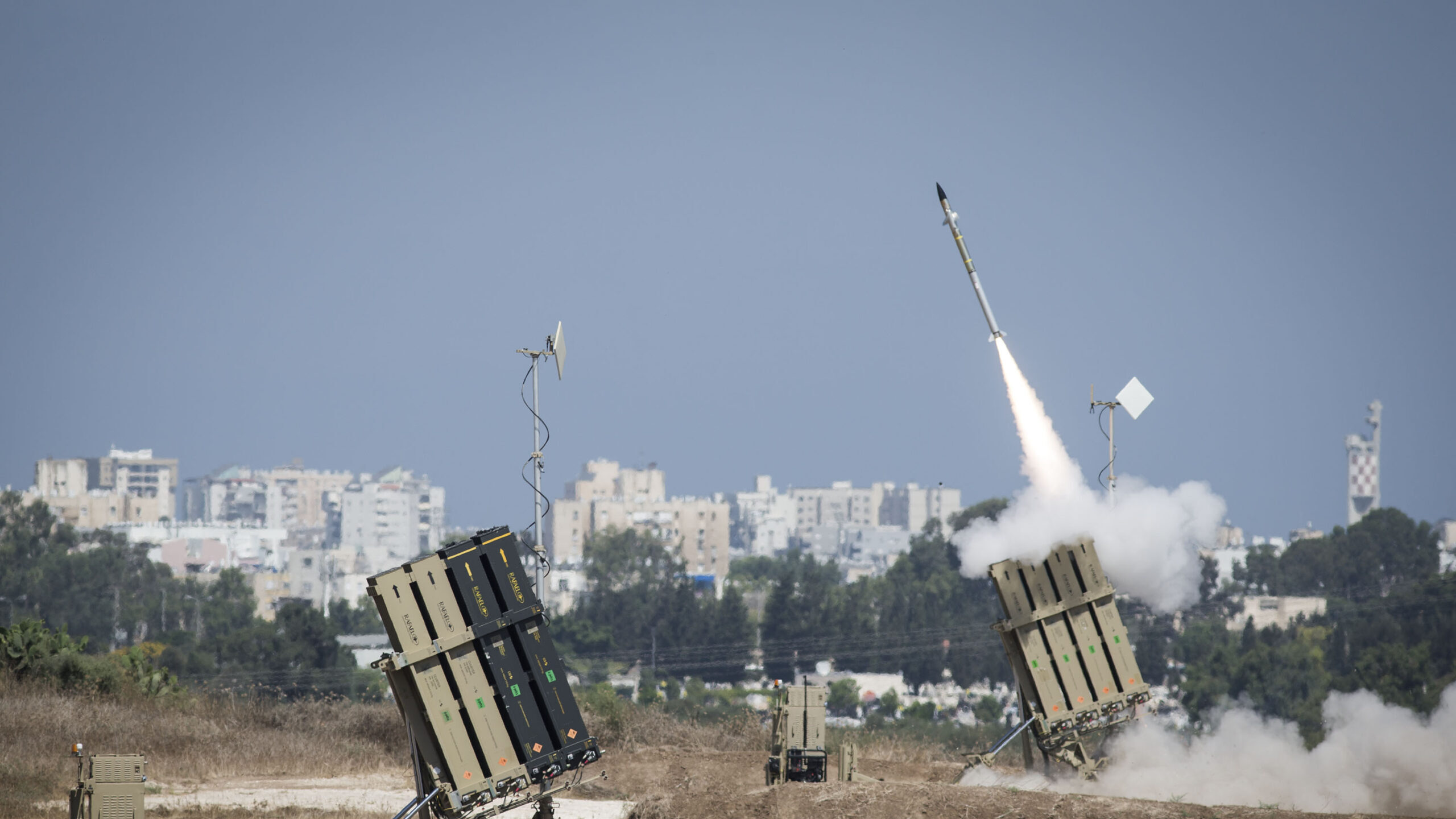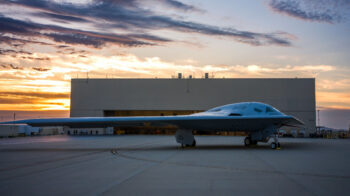
The Iron Dome air-defense system fires to intercept a rocket over the city of Ashdod on July 8, 2014, in Ashdod, Israel. (Ilia Yefimovich/Getty Images)
TEL AVIV — The Israeli decision not to provide weapon systems to Ukraine is meeting growing criticism among Israeli experts and politicians, following the Russian use of Iranian-made ballistic missiles and drones to attack civilian targets over the last week — a wave that some here hope will result in a reassessment of Israel’s neutral stance in the seven-month-old war.
Israeli defense sources said that the cooperation between Iran and Russia in Ukraine has changed the situation, and requires a total change in the Israeli approach towards giving Ukraine defensive systems. And Kyiv has noticed, today announcing plans to formally request Israeli air defense systems.
Discussions around the Ukraine issue are being kept low profile here, as politicians are busy getting ready for the general elections on Nov. 1, the fifth in less than three years. If the parties succeed in forming a stable coalition, the issue of military help to Ukraine in light of the Iranian involvement will be a high priority for deciding on following the current policy or changing it, sources here predict.
Russia is worried by the possible change in Israel’s policy and has released a direct warring. According to a report in The Guardian, Dimitry Medvedev, deputy chairman of the security council of Russia, used his Telegram account to warn Israel against a decision to supply military systems to Ukraine. He said that it would be “’a reckless move’ that would ‘destroy relations between our countries.’”
“They [Russia] feel that something is changing — slowly, but changing — and they immediately released this warning to Israel,” said one political source here, who indicated Moscow is reading the tea leaves correctly.
In the lead up to the Ukraine invasion and certainly since the conflict began, Israel has tried to thread a needle. Jerusalem has political relations with Ukraine, but has prioritized its relationship with Russia in order to ensure access to Syrian airspace for military strikes against Iranian-backed targets.
Days after the invasion, then-Foreign Minister Yair Lapid condemned the attack on Ukraine in broad terms, but Israeli politicians have largely avoided making public denouncements of Putin’s war. More importantly, Israel has not participated in any sanction regimes against Russia, and has both declined to sell weapons to Ukraine and denied countries that use Israeli-made weapons the right to transfer those to Ukraine.
Ukraine intensifying calls for Israel to provide air defense amid Russian attacks w/Iranian drones: “We [have been] working hard for a long time in order to ask Israel to get open to cooperation with Ukraine in the air defense sphere,” Ukrainian FM Kuleba told reporters today.
— Natasha Bertrand (@NatashaBertrand) October 18, 2022
Sources here tell Breaking Defense that Jerusalem also scrapped an in-the-works deal with Ukraine for Spike anti-tank missiles when the invasion began in February.
However, the winds of change appear to be blowing thanks to the use of Iranian-made weapons against civilians. The first sign that something is happening came from a statement by Lapid, now the prime minister, who tweeted on Oct. 10, “I strongly condemn the Russian attacks on the civilian population in Kyiv and other cities across Ukraine … I send our sincere condolences to the families of the victims and the Ukrainian people.”
On Sunday, Nachman Shai, a Minister in the Israeli cabinet, went further than any politician before, tweeting, “There is no longer any doubt where Israel should stand in this bloody conflict. The time has come for Ukraine to receive military aid as well, just as the US and NATO countries provide.”
RELATED: Estonian defense minister: New Russian commander behind increased civilian attacks in Ukraine
That comment set off Medvedev’s threat, and the Israeli government rushed to tell local outlets that Shai’s views do not reflect Jerusalem’s policy in any way. And yet, the comments do appear to represent a growing sense in the Israeli public, which is beginning to see ties between attacks on Ukrainian civilians and Israel’s self-image.
Ksenia Svetlova, the director of the Israel and the Middle East program at the Mitvim Institute for Regional Foreign Policies, told Breaking Defense that Israel prides itself on being the only democracy in the Middle East. It always cries out that the countries of the world do not support it enough and do not show solidarity every time an anti-tank missile or Qassam rocket is fired on its territory, she noted.
And yet, Israel “suddenly became silent in the face of cruise missiles that wiped out entire cities and killing pits that became mass graves: children, women and prisoners with their hands tied behind their backs,” she said.
While the outcome of the election is unclear — to the point that a government may fail to be formed and a sixth election in three years be required — the public pressure may be such that whomever ends up as prime minister will face a choice about helping Ukraine in new ways.
Israeli sources told Breaking Defense that Ukraine has for months asked Israel to supply its army with systems that will counter Russian missile attacks, and appearance of Iranian-made drones have done nothing to limit the hunger for Israeli systems. The request was mainly for air defense systems Iron Dome and Spyder, both made by Rafael, and the Israel Aerospace Industries-produced Barak 8.
For Iron Dome, a US approval is needed due to American funding that helped develop the system. However, during the summer visit of US President Joe Biden In Israel, Israel was asked to support Ukraine in more ways than it has done until today, so an export issue is not expected. The Spyder and Barak 8 are free for export, as the US has not funded either of them.
In the first phases of the war, the Ukrainians asked also for some types of Rafael Spike ground-to-ground missiles, but that unlike the air defense systems, is considered an offensive system and therefore is not on the list of potential Israeli systems that the Ukrainian embassy in Tel Aviv has submitted, per sources.
Countering Iranian-made UAVs in particular would seem a good fit for Israeli defensive systems that are well matched to that threat. However, Israel has declined Ukraine’s requests for counter-drone technology on numerous occasions. Israel had agreed to supply these systems to Ukraine prior to the war, but the license was suspended when the invasion started. Israeli defense sources added that some of the systems were demonstrated to Ukraine officials during visits in Israel.
China’s new H-20 stealth bomber ‘not really’ a concern for Pentagon, says intel official
“The thing with the H-20 is when you actually look at the system design, it’s probably nowhere near as good as US LO [low observable] platforms, particularly more advanced ones that we have coming down,” said a DoD intelligence official.


























